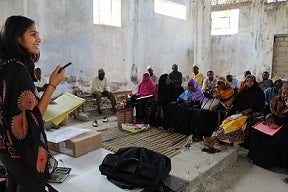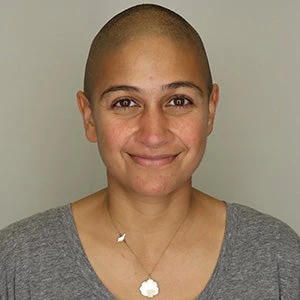My experiences with field work thus far have been nothing if not adventurous. I seem to attract broken glass – a rock the size of a small coconut crashing through my 3rd floor window in Zanzibar, for instance, or the windows of my taxi being broken with baseball bats by an armed mob in Mali. Just the other day, my boss and I came within inches of dying in a fiery plane crash – we were on our way back to the main island of Zanzibar from Pemba island in a tiny 12-seater Soviet-era plane, and were just about to land in a strong crosswind when the engine on my side failed. We managed to land, somehow, and taxied to a stop right there on the runway to wait for a vehicle (ironically, it ended up being an ambulance) to take us to the terminal.
 But somehow, even the excitement and stress of all these brushes with death pale in comparison to the stress and anxiety of the two months that I spent in Zanzibar earlier this year, setting up a field research experiment on the measurement of cassava productivity with the Ministry of Agriculture and Natural Resources. Measuring cassava productivity: it doesn’t sound like the most glamorous of pastimes. But in fact, cassava is a staple crop in many countries around the world, especially in sub-Saharan Africa, and is of particular importance when it comes to food security. And it turns out that it’s notoriously difficult to measure cassava production, since farmers tend to cultivate and harvest it year round – there’s no season as there is for rice or maize, and the crop stores better in the ground anyway, so farmers just harvest what they want to eat for breakfast that day. Cassava is probably the most inoffensive root vegetable – on its own, it manages to be less flavorful than even a potato. Taken at large, though, coming up with a good method for measuring the production of cassava and other continuous-harvest crops (like bananas, tomatoes, etc.) is actually very important for helping governments and donors to come up with sound agricultural policies and interventions.
But somehow, even the excitement and stress of all these brushes with death pale in comparison to the stress and anxiety of the two months that I spent in Zanzibar earlier this year, setting up a field research experiment on the measurement of cassava productivity with the Ministry of Agriculture and Natural Resources. Measuring cassava productivity: it doesn’t sound like the most glamorous of pastimes. But in fact, cassava is a staple crop in many countries around the world, especially in sub-Saharan Africa, and is of particular importance when it comes to food security. And it turns out that it’s notoriously difficult to measure cassava production, since farmers tend to cultivate and harvest it year round – there’s no season as there is for rice or maize, and the crop stores better in the ground anyway, so farmers just harvest what they want to eat for breakfast that day. Cassava is probably the most inoffensive root vegetable – on its own, it manages to be less flavorful than even a potato. Taken at large, though, coming up with a good method for measuring the production of cassava and other continuous-harvest crops (like bananas, tomatoes, etc.) is actually very important for helping governments and donors to come up with sound agricultural policies and interventions.
What this then translates into, in actuality, is me standing in front of a room of nearsighted Zanzibari agricultural extension officers, many of them pushing 60, attempting in broken Kiswahili to explain how to follow the skips in a relatively simple 8-page household questionnaire. Surveys don’t always progress in a linear fashion – often the answer to a given question determines what the following questions will be, and this is usually denoted in Living Standard Measurement Study (LSMS) surveys with a small arrow followed by the number of the next question that the interviewer should ask. I blithely assumed that this arrow concept would nearly explain itself, having worked with trained survey enumerators in the past on an impact evaluation in Malawi. Instead, it ultimately required what seemed to be hours of explanation, until we finally realized that many of the extension officers were in fact unable to see the questionnaire, at which point we bought everyone reading glasses. As it turns out, carrying out a survey effort isn’t as straightforward as one might think. In fact, nothing is as straightforward as one might think, when it comes to field work.
The saying goes that the two things you can always count on in life are death and taxes. From my experiences thus far, I’d say that the one thing you can always count on in fieldwork is delays. Delays are the only thing that will never let you down – they will always be there to trample upon your carefully planned schedules, make a mockery of your attempts at imposing order and organization, and break your heart. They start with the impossibility of arriving at any sort of meeting on time, continue with the impossibility of procuring any sort of good in a reasonable timeframe, and end with your entire project being delayed due to myriad problems with initial implementation. Delays can come about as a result of bureaucracy, holidays, transport problems, or, and it seems most commonly (and morbidly), funerals.
For example, the main survey method that we’re testing in Zanzibar for measuring cassava production is to give cassava farmers diaries where they can record their daily harvests (compared with asking them to recall their total production at the end of 6 months or a year, which is the more commonly used method; see Deininger et al.’s 2011 paper on diaries. vs. recall in Uganda for more information on this). To record their harvests more accurately, the farmers needed weighing scales so that they could record the information in kilograms as opposed to non-standard units like “heaps” and “bags”. Getting hold of these weighing scales, though, nearly gave me a nervous breakdown. For weeks, I woke up worrying about weighing scales, and went to bed fuming about weighing scales. Multiple flights to Dar es Salaam were required, invoices were collected and rejected, different types of scales were considered. By the time a company was chosen and approved to provide the scales, their stock had already been depleted and the remaining inventory was insufficient. After that, it seemed more signatures were required to approve the purchase. A week later, the CEO’s father died, so the company was closed for a week. After that, everyone at the Ministry was in meetings for a week and couldn’t be reached for approvals. Then, it seemed that the Ministry had to pay by check as a direct bank transfer was not an option. After that, it turned out the company couldn’t accept a check in its own name, as its bank account was for some reason under a different name. And at every misstep, it seemed the chain of approvals had to start all over again.
The example of the weighing scales is a microcosm of absolutely everything. But despite nonstop challenges - with procurement, training, implementation – somehow things generally seem to work out in the end, with a combination of patience, persistence, and occasional appeals to a higher authority (which might mean my boss, or might mean ‘insh’allah’, depending on the context). Eventually we did manage to get those weighing scales, and the farmers have thus far been successfully using them to record their harvest information. And two months into fieldwork, on a 3-week supervision trip that I just completed, I was gratified to see that the local team has in fact learned how to properly use compasses and GPS units to measure land area, and that as a result, we should be able to come up with a much more accurate and reliable measurement of land area than the current method (which is to collect data based on the ‘eye estimate’ of the agricultural extension officers). After months of hurdles and hardships, having a farmer hand me a perfectly completed diary, or seeing one of the teams measure a 20-sided zigzag plot with less than 1% error – it’s extremely satisfying. So, if the one thing you can be sure of in fieldwork is delays, maybe it’s also true that the best things in life are worth waiting for. Like good data.


Join the Conversation